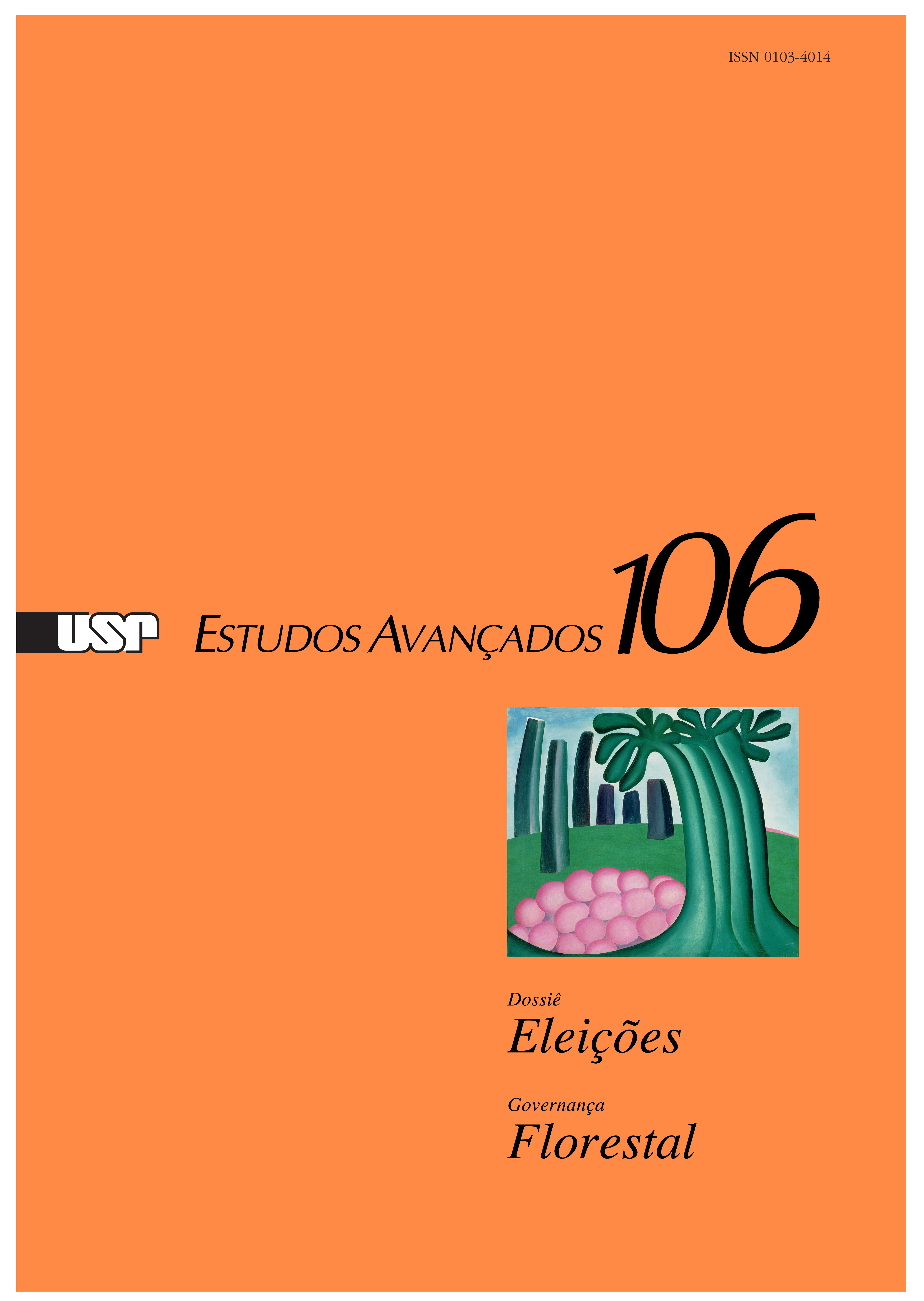Financiamento de campanhas e desempenho eleitoral das mulheres nas eleições brasileiras (1998-2020)
DOI:
https://doi.org/10.1590/s0103-4014.2022.36106.006Palavras-chave:
Sub-representação feminina, Eleições, Cotas de gênero, Financiamento de campanhas, Sucesso eleitoralResumo
Este artigo apresenta uma análise longitudinal das inovações institucionais nos mecanismos de promoção à igualdade de gênero na arena eleitoral brasileira nas últimas três décadas. São analisadas as três ondas de criação de instrumentos legais e as três reações adaptativas nas estratégias partidárias. Foram mobilizadas evidências empíricas das eleições gerais e municipais entre 1998 e 2020 no intuito de analisar a evolução da participação eleitoral feminina em quatro dimensões: candidaturas, despesas de campanha, votos e cadeiras conquistadas. Os resultados demonstraram que as duas primeiras ondas de inovações institucionais que introduziram as cotas por reserva de vagas (1995-1997) e a obrigatoriedade de preenchimento de candidaturas femininas (2009) tiveram suas efetividades mitigadas pelas reações conservadoras das estratégias partidárias. Apenas na terceira onda (2015-2018), advinda do poder judiciário, que proibiu o financiamento empresarial e instaurou a proporcionalidade de gênero na distribuição de recursos partidários, houve impactos significativos na representação feminina. Mesmo essas últimas inovações tiveram seus efeitos mitigados por estratégias adaptativas dos partidos que visavam a manutenção do status quo de uma representação predominantemente masculina. Estas estratégias têm dificultado o progresso da promoção de igualdade de gênero na arena eleitoral, tornando-o mais lento e gradual do que o preconizado pelos instrumentos legais.
Downloads
Referências
ARAÚJO, C.; ALVES, J. E. D. Impactos de indicadores sociais e do sistema eleitoral sobre as chances das mulheres nas eleições e suas interações com as cotas. Dados, v.50, n.3, p.535-77, 2007.
ARAÚJO, C.; BORGES, D. O gênero, os elegíveis e os não-elegíveis: uma análise das candidaturas para a Câmara Federal em 2010. In: ALVES, J. E. D.; PINTO, C. R. J.; JORDÃO, F. Mulheres nas eleições 2010. São Paulo: ABCP/Secretaria de Políticas para as Mulheres, 2012. p.370.
AVELAR, L. O segundo eleitorado: tendências do voto feminino no Brasil. 2.ed. Campinas: Editora da Unicamp, 1989. v.1.
BALDEZ, L. Elected Bodies: The Gender Quota Law for Legislative Candidates in Mexico. Legislative Studies Quarterly, v.29, n.2, p.231-58, 2004.
BIROLI, F. Divisão Sexual do Trabalho e Democracia. Dados, v.59, n.3, p.719-54, set. 2016.
BOHN, S. Mulheres brasileiras na disputa do legislativo municipal. Perspectivas: Revista de Ciências Sociais, v.35, 2009.
BOLOGNESI, B. A cota eleitoral de gênero: política pública ou engenharia eleitoral? Paraná Eleitoral: Revista Brasileira de Direito Eleitoral e Ciência Política, v.1, n.12, p.18, 2012.
CAMPOS, L. A.; MACHADO, C. Raça e eleições no Brasil. Porto Alegre: Zouk, 2020.
CAMPOS, L. F. Litígio estratégico para igualdade de gênero: O caso das verbas de campanha para mulheres candidatas. Revista Direito e Práxis, v.10, n.1, p.593-629, mar. 2019.
CERVI, E. U. Financiamento de campanhas e desempenho eleitoral no Brasil: análise das contribuições de pessoas físicas, jurídicas e partidos políticos às eleições de 2008 nas capitais de Estado. Revista Brasileira de Ciência Política, n.4, p.135-67, 2010.
FOX, R. L.; LAWLESS, J. L. Entrando na arena?: gênero e a decisão de concorrer a um cargo eletivo. Revista Brasileira de Ciência Política, n.8, p.129-63, ago. 2012.
FOX, R. L.; LAWLESS, J. L. Uncovering the Origins of the Gender Gap in Political Ambition. American Political Science Review, v.108, n.3, p.499-519, ago. 2014.
HIRSCHMAN, A. O. A retórica da intransigência: dois anos depois. São Paulo: Cia. das Letras, 1992.
MIGUEL, L. F. Teoria política feminista e liberalismo: o caso das cotas de representação. Revista Brasileira de Ciências Sociais, v.15, n.44, out. 2000.
MIGUEL, L. F.; QUEIROZ, C. M. DE. Diferenças regionais e o êxito relativo de mulheres em eleições municipais no Brasil. Revista Estudos Feministas, v.14, n.2, p.363-85, set. 2006.
NICOLAU, J. O sistema eleitoral de lista aberta no Brasil. Dados, v.49, n.4, p.689-720, 2006.
NICOLAU, J. Sistemas Eleitorais. [s.l.] FGV, 2015.
NORRIS, P. Recrutamento político. Revista de Sociologia e Política, v.21, n.46, p.11-32, jun. 2013.
PEIXOTO, V. de M. Financiamento de campanhas: o Brasil em perspectiva comparada. São Paulo, v. 35, p. 26, 2009.
SACCHET, T. A culpa é dos partidos: desigualdades de gênero em disputas eleitorais. In: Mulheres, poder e ciência política. Campinas: Editora da Unicamp, 2020. v.1, p.75-108.
SACCHET, T.; SPECK, B. W. Financiamento eleitoral, representação política e gênero: uma análise das eleições de 2006. Opin. Publica, v.18, n.1, June 2012a.
SACCHET, T.; SPECK, B. W. Dinheiro e sexo na política brasileira: financiamento de campanha e desempenho eleitoral em cargos legislativos. ALVES, J. E. D.; PINTO, C. R. J.; JORDÃO, F. Mulheres nas eleições 2010. São Paulo: ABCP/Secretaria de Políticas para as Mulheres, 2012b. p.37.
SCHEIDWEILER, G. O Timing do Financiamento Eleitoral em Campanhas Eleitorais de Mulheres. Compolítica, v.65, n.8, p.770-1, 2021.
SPECK, B. W. Reagir a escândalos ou perseguir ideais? A regulação do financiamento político no Brasil. Cadernos Adenauer, v.6, n.2, p.123-59, 2005.
WYLIE, K.; SANTOS, P. dos; MARCELINO, D. Extreme non-viable candidates and quota maneuvering in Brazilian legislative elections. Opinião Pública, v.25, n.1, p.1-28, abr. 2019.
Publicado
Edição
Seção
Licença
Copyright (c) 2022 Vitor de Moraes Peixoto, Larissa Martins Marques, Leandro Molhano Ribeiro

Este trabalho está licenciado sob uma licença Creative Commons Attribution-NonCommercial 4.0 International License.
Estudos Avançados não celebra contrato de cessão de direitos autorais com seus colaboradores, razão pela qual não detém os direitos autorais dos artigos publicados. Os interessados em reproduzir artigos publicados na revista devem necessariamente obter o consentimento do autor e atribuir devidamente os créditos ao periódico.


